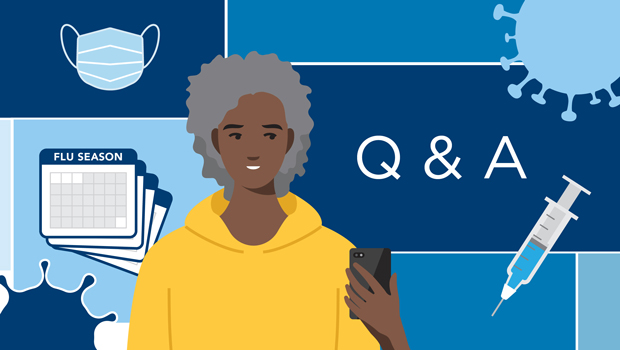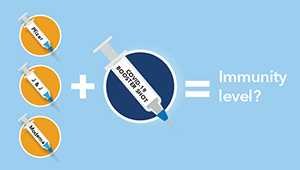COVID-19 and flu: What to expect this winter

Answers to 4 questions about COVID-19 and this season's flu, from KPWHRI's Michael Jackson, PhD, MPH
Labor Day is around the corner. That means school is starting, offices are filling up after summer vacation, and outdoor entertaining is moving inside. This time of year also means an opportunity to get the annual flu vaccine.
This year, though, our activities have an overarching question: How will COVID-19 affect our plans? We asked Michael L. Jackson, PhD, MPH, a Kaiser Permanente Washington Health Research Institute senior investigator who studies infectious diseases including influenza and COVID-19. Here are his answers to 4 questions about how to protect against these and other respiratory illnesses this fall.
1. What are experts predicting about flu season and potential COVID-19 surges this fall and winter?
What happens this winter is going to depend on a few factors. The most important ones are how many people are immune to COVID-19 (which can improve as people continue to get vaccinated) and how much people are practicing social distancing (either voluntarily or as mandated by business restrictions or school closures).
In Washington state, between trends in vaccination and the relaxing of social distancing mandates, my guess is that we’ll see a lot of COVID-19 cases this winter — possibly even more than last winter. But I’m hopeful that we won’t see as many COVID-19 hospitalizations and deaths. Some places like Scotland and England that are highly vaccinated are seeing rising cases right now, but they are seeing many fewer hospitalizations than they did in earlier COVID-19 waves.
Influenza is more uncertain. Since very few people got the flu last year, we’ll have more people who are susceptible to it this year than we typically do. We could be looking at larger-than-average epidemics of influenza and other respiratory viruses (like respiratory syncytial virus) this winter.
The size of the influenza epidemic will probably depend on how much people are still practicing social distancing. If people are still being cautious, that might blunt the flu somewhat. Or if a lot more people get vaccinated against influenza than usual, that could also make for a smaller epidemic.
2. Cases of the flu were dramatically lowered last season by measures to reduce COVID-19 such as mask-wearing and social distancing. How does that affect this year's flu vaccine recommendations?
The CDC (Centers for Disease Control and Prevention) has not yet published this year’s influenza vaccine recommendations. But the recommendations will probably be quite similar to what we’ve seen in past years, including during the pandemic.
The CDC typically recommends that everyone 6 months old and older get vaccinated against influenza. There are a few exceptions for people who have a higher risk of vaccine-related complications, but those are rare. The main exception is for people who have had Guillain-Barre syndrome after a previous influenza vaccine. People with an egg allergy should get one of the egg-free influenza vaccines (Flublok or Flucelvax).
3. What do we know about possible COVID-19 vaccine boosters?
We know that booster doses can raise antibody levels, including antibodies that target some of the SARS-CoV-2 variants that are circulating right now.
However, it’s too early to be thinking about COVID-19 boosters. We have a lot of evidence that the current vaccines are protective against the common SARS-CoV-2 variants, including the Delta variant. So, we don’t yet have evidence that you need a booster dose to keep ahead of the evolution of SARS-CoV-2. We also know that immunity after vaccination has lasted for as long as we’ve been able to measure it. So, people don’t yet need a booster to avoid having their immunity wane over time.
As we learn more, we might find that booster doses do become necessary at some point. But right now, my opinion is that we should be sharing as many doses with low- and middle-income countries as possible, rather than worrying about giving boosters to people here in the U.S.
4. What resources should we be watching to keep informed about influenza and COVID-19 this fall?
Kaiser Permanente has basic information about the flu as well as COVID-19 information for each region.
The Washington State Department of Health publishes a lot of good data on what’s happening in the state, both for COVID-19 and for influenza. I pay attention to both of those. They also give good recommendations for prevention and how to protect yourself and your family.
Influenza

Flu shot Q & A: Does COVID-19 change our approach?
KPWHRI’s Michael L. Jackson, PhD, MPH, talks about influenza vaccine research in the age of the pandemic.
Research

COVID-19 pandemic research at KPWHRI
Having long tracked infectious diseases and tested vaccines, KPWHRI now focuses on the novel coronavirus.
Volunteers needed

COVID-19 booster trial seeks unvaccinated volunteers
KPWHRI to access the benefits of mixing different vaccine types in NIAID-sponsored study.


